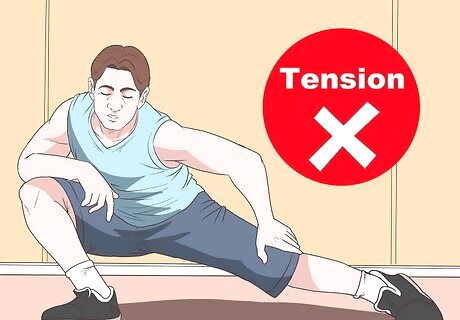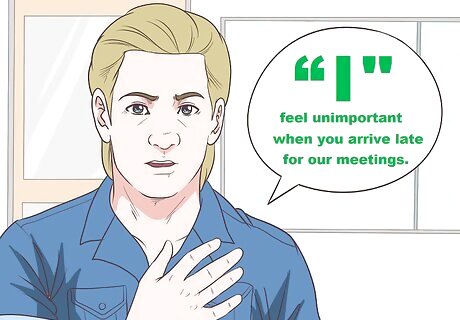
views
- Stop mid-sentence when you notice yourself yelling. Cutting yourself off when you begin to raise your voice can prevent you from saying something you might regret.
- Take deep breaths to calm yourself down and regulate your stress response. A few deep breaths in and out may be all you need to settle down and stop yelling.
- Count down from 10 to distract your mind and regulate your emotions. When you get down to 1, you might feel less inclined to yell.
Taking a Timeout

Stop mid-sentence when you notice yourself yelling. The moment you hear yourself raising your voice, pause. Don't even finish your sentence. Think to yourself, “What am I trying to say? And what is the best way to say it?” Learning to stop yourself before or when you start yelling can prevent you from saying something you'll regret or jeopardizing your relationships.

Breathe deeply to ease your anger. Deep breathing promotes the relaxation response, so after a few breaths you'll feel calmer and more in control. Draw in a breath through your nose for a few counts, hold it, then release it from your mouth for a few counts. Repeat until the tension fades.

Count to 10 to calm down. Counting takes your mind away from what's making you angry and allows you to focus on something else. Start at 1 and work your way up to 10 or even 100 so that you can regain control of your emotions. You can count aloud or silently to yourself, depending on your preference.

Get some fresh air. Leave the environment for a few minutes and take a walk around the block. Being in nature can help soothe you and clear your mind so that you can deal with your anger in a more appropriate way.Calming Yourself Outside:Tell the other person that you need to leave for a few minutes. Say something like, “I need to calm down and I can’t do that here. I’m going for a walk.” It might feel abrupt, but the important thing is to get yourself out of the room before you say something you regret. You can apologize when you get back.Take a walk. Set a fast pace to burn off steam. Focus on your legs moving and your heart pumping, taking deep breaths. The movement will calm your body down and, eventually, your mind too.Force yourself to notice 3 things around you. It may be the last thing you want to do when you’re feeling angry, but force yourself to look at the sky, the leaves on the trees, or the cars passing by. Distracting yourself for even a moment can break the momentum of your anger.

Stretch to relieve tension. Use your timeout to relax your muscles. Stretch each muscle group of your body while taking deep breaths. If you are familiar with yoga, you might also do a few asanas to help ease tension in your body.Calming Stretches:Twist your body gently from side to side. Hold your arms up comfortably, with your elbows bent. Twist your torso from your hips, turning on one foot, then swing slowly to the other side to loosen up your whole body.Bend and touch your toes. Bend forward from your hips, keeping your spine straight, and reach your fingers to your toes. Let your head and neck fall forward and relax. It’s ok if you can’t reach all the way to your toes—just reach as far as you can. This surrendering pose helps you let go of your anger.Open up your hips. Place your feet wider than shoulders-width apart and bend at your knees. Place your hands just above your knees and straighten one arm. Lean your body the other way to feel a stretch in that hip and groin. Hold for 10 seconds, then switch sides. Many people carry a lot of tension in their hips, so stretching them out can unlock that anxiety.
Getting Your Point Across
Think before you speak. If you have a tendency to shout when you’re mad, you are likely an “emotional communicator.” This means that you may tend to speak or act based on feelings and instincts, rather than reasoning things out. Taking a few moments to consider what you want to say can help you evaluate your reactions and communicate more calmly.

Apologize for yelling. Extend goodwill to the other person and apologize. Communicate that you realize you shouldn't have yelled and would like to discuss the matter more civilly moving forward.Making an Apology:Take a deep breath. It feels incredibly hard to stop yourself in the middle of your anger and say an apology. Give yourself a moment to close your eyes, take a deep breath, and get control of emotions.Start with a calming word. Start your apology by saying something like “OK,” or “Alright.” This signals to the other person that you’re changing your tone, and can help to calm you down too.Be honest and sincere. Tell the other person that you’re sorry for yelling and that you’re having trouble controlling your anger. Ask if you can start the discussion over and try to express yourself better.

Speak in a whisper. Ensure your tone and volume don't creep back into shouting territory by using a very quiet, “indoor" voice or a whisper. Speak as though you are in a library. If you are talking to your children, get in the habit of whispering or using a hushed voice when you are mad. Whispering has a double-purpose: it helps you keep your voice at an appropriate volume and it ensures that the other person will be fully tuned in so they can figure out what you're saying.

Remove absolute language. Some of the words you use while communicating can actually make you even more angry. Drop absolute terms like “always,” “never,” “should,” or “must.” These words spark conflict because they are judgmental, accusatory, and leave little wiggle room.

Use “I" statements. Get your point across more effectively using statements that express your feelings without attacking the other person. These might sound like “I feel unimportant when you arrive late for our meetings.” “I” statements help you take ownership for what you feel instead of putting it all on the other person. Avoid “you” statements that place blame, like “You don't care about me. You're always late!”
Managing Your Anger Better
Set a rule for yourself not to yell, ever. Yelling tends to be counterproductive in a conflict or argument, because it stresses the other person out and activates their fight or flight response. They are likely to tune out what you are actually saying and just get upset. This is especially true of kids. Make it a goal to stop yelling completely. It may take time for you to achieve this goal, but don’t give up. If you find yourself yelling or about to yell, remind yourself of the rule and take a moment to calm down. EXPERT TIP Chloe Carmichael, PhD Chloe Carmichael, PhD Licensed Clinical Psychologist Chloe Carmichael, PhD is a Licensed Clinical Psychologist who runs a private practice in New York City. With over a decade of psychological consulting experience, Dr. Chloe specializes in relationship issues, stress management, self esteem, and career coaching. She has also instructed undergraduate courses at Long Island University and has served as adjunct faculty at the City University of New York. Dr. Chloe completed her PhD in Clinical Psychology at Long Island University in Brooklyn, New York and her clinical training at Lenox Hill Hospital and Kings County Hospital. She is accredited by the American Psychological Association and is the author of “Nervous Energy: Harness the Power of Your Anxiety” and “Dr. Chloe's 10 Commandments of Dating.” Chloe Carmichael, PhD Chloe Carmichael, PhD Licensed Clinical Psychologist When you feel like you want to yell, try articulating exactly why you're angry instead. A lot of people lose their ability to put things into words clearly when they're angry, but it's really helpful to explain clearly in words how you're feeling to either the person who made you angry or to someone in your support network. Learning how to regain our verbal abilities is actually one of the most calming things that we can do.

Learn to spot anger cues. Take note of the sensations happening in your body. This can help you identify when you are getting angry so you can take adaptive steps to deal with it.Becoming Perceptive to Your Anger:Recognize your physical symptoms of anger. Observe your behavior for a week and jot down how you feel when you're getting angry. Your heart might beat fast, for example, you might start to sweat, or your face might flush.Evaluate how you’re feeling throughout the day. Check in with yourself periodically to see how you’re feeling and reacting in the moment. You can even use an app to help, like iCounselor: Anger, or measure on an “anger scale, which you can find online.Pick up on your anger and deal with it quickly. When you realize that you’re starting to get angry, make a deliberate effort to confront and calm your feelings before they get out of control.

Address issues immediately instead of letting them pile up. If you're the type to let things build and build until you explode, change your tactics. Set aside a set window of time to discuss problems. This should be regular and ongoing. For example, rather than blowing up at your spouse when they fail to complete chores for the third time in a week, address the issue during a nightly check-in.

Do daily relaxation techniques. Make relaxation a part of your daily routine by checking in with your breath, doing mindfulness meditation, or performing progressive muscle relaxation. These strategies can help you keep stress and anger at bay, so you don't feel the urge to yell at the people around you. Try doing at least 1 relaxation exercise for 10 to 15 minutes daily.
Practice self-care to reduce your stress levels. You may be getting angry and yelling a lot because your stress levels are too high. Take your anger as a signal that something in your life needs to change. Set aside time every day to do the things you need to do for your physical and emotional health, such as: Eating 3 healthy and nutritious meals a day. Getting enough sleep (7-9 hours a night). Taking at least a little time to yourself to unwind and do things you enjoy.

Talk to someone you can trust. The listening ear of a partner, sibling, or friend might be just what you need to reduce tension or brainstorm appropriate ways of dealing with anger or solving problems. Reach out to your support system rather than bottling up your anger. If you don’t have anyone you can trust, consider speaking with a counselor about what's making you angry.Opening UpSit down in a quiet, safe environment. Ask a close friend or family member to sit down with you when you’re both feeling calm. Choose someplace quiet, where you know you won’t be walked in on, such as your room or a quiet park.Be honest. Tell them about your anger and what it feels like when you’re yelling. You can discuss what you’re doing to overcome it and what difficulties you’re having. They can suggest tips or simply listen to you.It’s ok to ask for help. Talking to someone about your feelings doesn’t mean you need to ask them for advice—maybe you simply want someone to vent to. If you do want to see if they have any tips, though, you should feel free. They’ll respect you for asking for help, and may offer some good advice.
Evaluate if you need anger management or communication classes. If you’re having a really hard time with yelling and other angry behaviors, you might benefit from a class that teaches healthy coping techniques. Think about your behaviors and how others react to you. Ask your therapist or doctor to recommend an anger management program if you feel you need one. You might need a class if: You find yourself getting angry often. Other people tell you that you yell a lot. You feel like other people won’t understand you unless you yell at them.


















Comments
0 comment